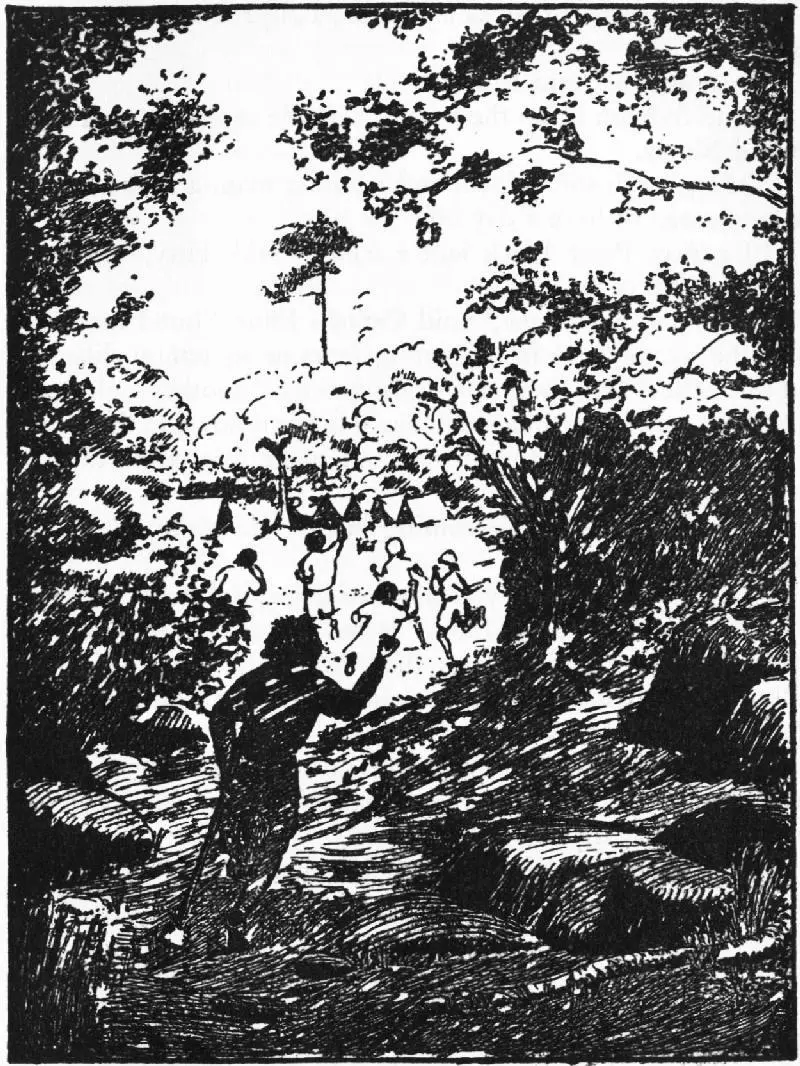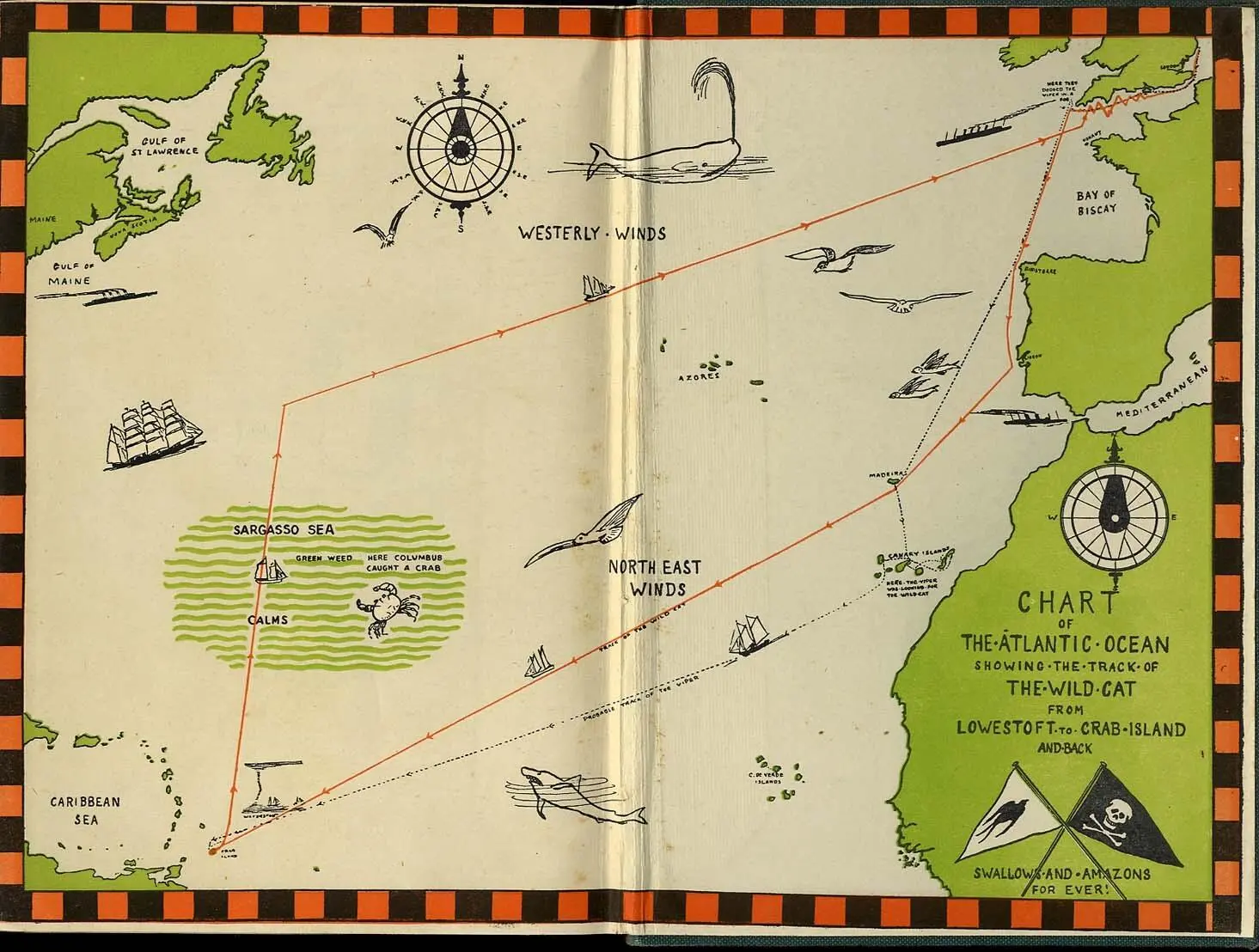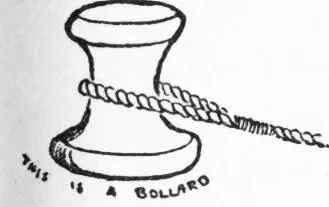“They’ve got tents just like ours,” said Roger, as he swung desperately from foot to crutch and from crutch to foot, determined not to be last.
Nancy and Peggy charged at the big tent. The others rushed past the fireplace, across the open ground.
“But they are ours,” said Susan.
“Pretty Polly!” said a harsh voice.
The camp had no defenders. The fire in Susan’s old fireplace had burned very low, and at the farther side of the camp with his back propped against a tree, was Captain Flint, just opening his eyes, while the ship’s parrot, perched beside him on one of the roots of the tree, was trying to pull his pipe to pieces.
“Hullo,” said Captain Flint, “what time is it? I sat down for a minute to play with old Polly. Hot work, you know, shifting all these things down to the launch, and that tree takes some climbing, too. Why, what on earth’s the matter with you all?”
The Swallows and Amazons looked at each other.
“Oh, nothing,” said Captain Nancy. “We mistook you for somebody else.”
Captain Flint stretched himself, and felt for his pipe.
 THE CHARGE
THE CHARGE
“Back at your old tricks again, eh, Polly? I must have been asleep.”
“Fast asleep,” said Roger.
“And did you bring the whole caboodle across by yourself?” asked Nancy.
“Mary Swainson helped, and a young man, a friend of hers who seemed to have a day off.”
“I expect Peter Duck lent a hand,” said Titty, “with the things in his cave.”
“He must have done,” said Captain Flint, “but I may have put the wrong bags in the wrong tents or something like that at this end. Mary Swainson’s going to have another look round up there, and if anything’s left she’ll bring it down to the farm.”
“Let’s go across to-morrow and make her come to tea,” said Titty.
“There’s another hole coming in my knickerbockers,” said Roger.
“But whatever made you think of doing it?” asked Nancy.
“Well,” said Captain Flint, “it was just as well to make sure of your island, and besides that there’ll be grouse-shooting all over those moors to-morrow, and both your mothers seemed to think you’d be best out of the way.”
“So that was why they hadn’t put a place for you at the feast,” said Nancy. “But you haven’t asked who won the race. We lost, if you want to know.”
“I thought Swallow had a good chance when I saw you go into Rio Bay while John went up the other side of the islands.”
“But you don’t know what John did with her at the end.”
There was the whole story of the race to tell him, and after that they changed their minds and told him how they had seen the lantern and the smoke on the island and had thought the island had been taken by enemies.
“And now we’ve got it for ever and ever,” said Roger.
“Until you have to go away,” said Captain Flint. “And if I don’t go away at once I shall be getting into trouble.”
“But she’s gone,” said Titty.
Captain Flint laughed.
“Cook’s nearly as bad,” he said.
A few minutes later he was aboard the launch, chug, chugging away past Look Out Point, while everybody shouted their thanks after him and asked him to come again to-morrow.
“You can give me supper,” he shouted back. “I’ll be sleeping in the houseboat to-morrow night. Oh, yes, and I was to tell you that Mrs. Dixon will have milk for you in the morning.”
The Swallows and Amazons went down again into their camp.
“Well,” said Nancy, “the holidays have really begun now.”
“We’ve got a good lot to put on our map already,” said Titty.
“Pouf!” said Susan, raking the sticks together in the fireplace. “Isn’t it a blessing to get home?”

Table of Contents
1Mixed Moss By a Rolling Stone. Pub. 1930, 8th edition 1931.
Table of Contents
Note on the Pictures
Book One
Chapter I. Quayside
Chapter II. Red-Haired Boy
Chapter III. Trial Trip
Chapter IV. Washing the Anchor
Chapter V. Peter Duck Spins His Yarn
Chapter VI. And Winds It Up
Chapter VII. Outward Bound
Chapter VIII. First Night at Sea
Chapter IX. Beachy Head to the Wight
Chapter X. Captain Flint’s Fidgets
Chapter XI. Words in the Dark
Chapter XII. Blind Man’s Buff
Chapter XIII. Decision
Chapter XIV. Quit of the Viper
Chapter XV. Bill Finds His Place
Chapter XVI. The Madeiras at Dusk
Book Two
Chapter XVII. Trade Wind
Chapter XVIII. Land Ho!
Chapter XIX. Island Morning
Chapter XX. Blazed Trail
Chapter XXI. Duckhaven
Chapter XXII. Good-Bye to the Wild Cat
Chapter XXIII. Swallow’s Voyage
Chapter XXIV. Diggers’ Camp
Chapter XXV. Diggers at Work
Chapter XXVI. Threatening Weather
Chapter XXVII. Great Guns
Chapter XXVIII. The Finding of the Treasure
Chapter XXIX. Spanish Galleon
Chapter XXX. Dirty Work
Chapter XXXI. The Only Hope
Chapter XXXII. Whose Steps in the Dark?
Chapter XXXIII. All Aboard Once More
Chapter XXXIV. Waterspout
Chapter XXXV. “Bonies” and “Mallies”
Chapter XXXVI. “Spanish Ladies”
Footnotes

 THE ADVENTURERS SET SAIL
THE ADVENTURERS SET SAIL

Table of Contents
When we began to do these pictures we decided that each of us was to put her (or his) name to her own works of art. But this was hopeless. Everybody wanted to help with every picture, even passing natives who saw what we were doing. So we had to leave all names out except in the case of Roger’s two pictures which anybody would know anyhow.
CAPTAIN NANCY BLACKETT
TO
MRS. ROBERT BLACKETT AND MRS. E. H. R. WALKER
A HUMBLE APOLOGY FOR THE UNGRATEFUL
BRUTALITY WITH WHICH THEIR
CHILDREN ELIMINATED
THEM FROM THESE
ADVENTURES
Table of Contents
Table of Contents
“He turns his head, but in his ear
The steady trade-winds run,
And in his eye the endless waves
Ride on into the sun.”
BINYON.

Peter Duck was sitting on a bollard on the north quay of Lowestoft Inner Harbour, smoking his pipe in the midday sunshine and looking down at a little, green, two-masted schooner that was tied up there while making ready for sea. He was an old sailor with a fringe of white beard round a face that was as brown and wrinkled as a walnut. He had sailed in the clipper ships racing home with tea from China. He had sailed in the wool ships from Australia. He had been round the Horn again and again and knew it, as he used to say, as well as he knew the crook of his own thumb. But for a long time now he had left the sea. He lived in an old wherry on the Norfolk rivers, sailing this way and that between Norwich and Lowestoft and Yarmouth and Beccles, sometimes with a cargo of potatoes, sometimes with a cargo of coals, and sometimes with the deck of his wherry piled so high with reeds for thatching that the sail would hardly clear them. But he had not very much to do and every now and then he used to leave his old wherry in Oulton Broad and slip down to Lowestoft to look at the boats and the fishermen and to smell the fresh wind blowing in from the sea. And for two or three days now he had been coming along to smoke his pipe on this particular bollard because he liked the looks of the little green schooner that was lying there moored to the quay.
Читать дальше

 THE CHARGE
THE CHARGE

 THE ADVENTURERS SET SAIL
THE ADVENTURERS SET SAIL












